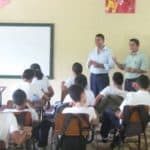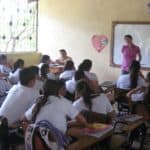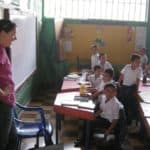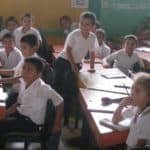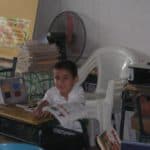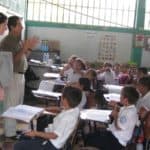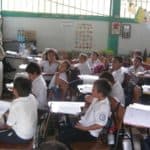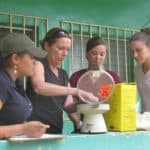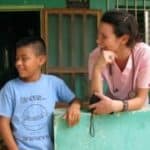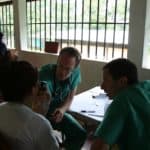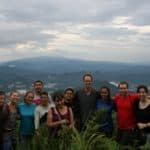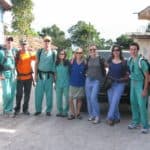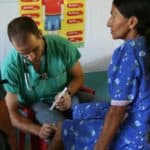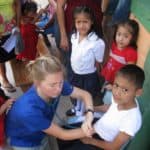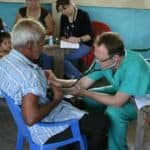This month, our local comites, our local community Hombro a Hombro committees, are organizing a clothing drive for newborns who are delivered at Hombro a Hombro clinics.
Many of our community members cannot afford even the most basic necessities for their children. They arrive from the campo without blankets, beanies, or clothes for their newborns.
Following the opening of our new hogar, or home away from home, in Concepción, our comites recognized the need to provide needy families with proper newborn clothing.
This week, we visited local area schools to get out the word. Later this month, our staff, local volunteers, and comite members will go door to door soliciting donations.
A Word on Brigades
In November 2012, the U.S. State Department issued a travel warning for parts of Honduras, including the states where Tegucigalpa and San Pedro Sula are located. Intibucá was not named in the travel warning.
On February 19, 2013, U.S. Ambassador to Honduras Lisa Kubiske tweeted: “Proud to meet the Public Health Brigade from my alma mater Brandeis. Look forward to seeing more volunteer groups soon.” How should we react when the State Department issues a travel warning, but the Ambassador encourages brigades to come to Honduras?
Honduras is certainly not without its problems. For generations, there have been problems with political instability, corruption, and violence. Over the last two decades, the country has seen a rise in drug and human trafficking. For the most part, Intibucá has avoided much of the violence associated with Tegucigalpa, San Pedro Sula, and the North Coast. Intibucá has problems, but currently they are largely limited to alcohol, ongoing family or business disputes, and domestic violence.
The safety of brigades visiting Shoulder to Shoulder remains our number one concern. As a result of the travel warning, we decided to temporarily suspend certain brigades, including less established brigades and certain undergraduate programs.
Brigades associated with Shoulder to Shoulder are subject to rigorous safety checks, including undergoing safety training and passing a test prior to visiting Honduras. When the brigades are away from our service areas, they stay in secure hotels and are supervised by both US- and Honduras-based brigade coordinators.
In our 23-year history, we have never had a violent incident involving a brigade member. Still, we remain vigilant with our brigade members. The brigades sleep securely in one of our two CMI clinics or one of our three affiliate clinics. Fieldwork is performed under the supervision of our Honduran doctors and nurses or American brigade leaders.
We recognize that brigades play a central role in the education of both US and Honduran practitioners, and have formed the basis for many a practitioner’s desire to volunteer, contribute, or practice in needy areas worldwide. Brigade alumni remain our most vocal advocates.
Honduras, the United States, and Shoulder to Shoulder remain committed to fostering individual development in a safe environment. For more information regarding our brigades, please e-mail Scott Reinstein at scott@shouldertoshoulder.org.
Hombro a Hombro Expands Services
We’ve just finished our winter meetings with the Ministry of Health and are excited to announce changes and additions to Shoulder to Shoulder/Hombro a Hombro’s coverage in Intibucá.
First and foremost, we have added the municipality of San Marcos de Sierra to our catchment area, which includes roughly 9,000 people. This brings our total number of patients served to 36,212 people, delivering care through five CESAMOs (primary care health offices staffed with a doctor), 6 CESARs (primary care health offices staffed with a nurse), three affiliate clinics (Pinares-Virginia Commonwealth University, Guachipilhincito-Brown University, Agua Salada-University of Wyoming), 2 Centros Maternas y Infantiles, “CMIs” (Santa Lucia and Concepción), our health promoters, and Equipos de Atención Primarias, “EAPs.”
Free Health Services
Based on our contract (“convenio”) with the Ministry of Health, Shoulder to Shoulder/Hombro a Hombro will continue to offer free care in the areas of emergency, primary, and prenatal and neonatal care. Shoulder to Shoulder/ Hombro a Hombro will also continue to provide free community health, education, and nutrition programs for our communities.
The New Year brought us amazing doctors, nurses, and health promoters to our clinics and communities as new hires or for their social service year. We will feature profiles of our staff in coming installments.
2013 also brings a change to how we reach our patients. We have begun sending out Equipos de Atención Primarias, “EAPs,” into our communities every day. EAPs are comprised of a doctor, a nurse, and a health promoter. For more information regarding EAPs, turn to Page Two, and for more information regarding our health promoters, turn to Page Five.
Dental Services
We continue to offer state-of-the-art dental clinics in both Santa Lucia and Concepción that are among the best in Honduras. Our dentists provide a wide variety of restorative and cosmetic dental procedures. The offices feature dental x-rays and computerized dental records and tooth charts. In 2012, our dentists saw 3,286 patients and performed 4,333 fillings and 1,709 extractions. The fee schedule is subsidized by donations and represents a fraction of the retail cost of the work performed.
In addition to the work done in the clinics, we operate a prevention program in 12 area schools. This consists of a dentist visiting the class three times per year to apply fluoride and screen children for needed restorative work. The children are brought into the clinic for any needed procedures.
In 2012, we saw 421 children in Santa Lucia and performed 253 extractions, 1,299 fillings, 1,475 sealants to prevent tooth decay, and 1,320 fluoride treatments. In Concepción, where we have had a longer presence, we have seen 280 children, performed 171 extractions, 314 fillings, 718 sealants, and 354 fluoride treatments. Today, nearly all of the students in the program are cavity-free.
This program is funded by donations of 1000 Lempiras (US $50) per child per year.
Advanced Medicine Consults
In addition to the work we do under the convenio, this year we are also providing a number of advanced medicine services to the public for a fee. This includes being seen directly by a physician with family practice training and on-the-spot access to advanced diagnostic equipment including x-rays, ultrasound, endoscope, and more than 50 lab tests. These physicians can also obtain phone or e-mail consultation with specialists who have electronic access to medical charts, lab results or x-rays. We charge 250 Lempiras, or about US $12.50, for elective Advanced Medicine consults. The consult fees and any necessary medicines or lab tests are priced based on the market rates in La Esperanza and other nearby locations.


